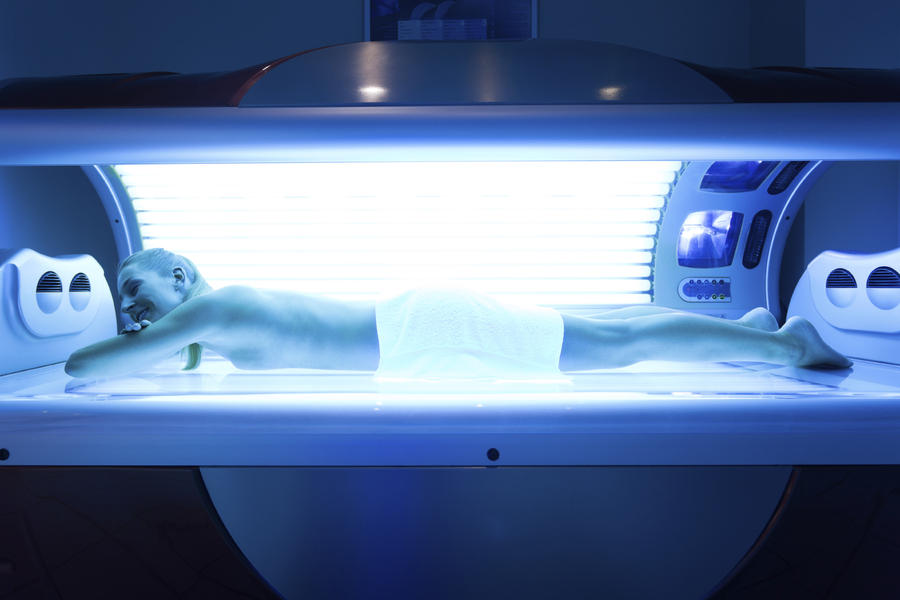As deadly skin cancer rates keep climbing, surgeon general says to stop tanning and wear sunscreen


A free daily email with the biggest news stories of the day – and the best features from TheWeek.com
You are now subscribed
Your newsletter sign-up was successful
The acting U.S. surgeon general delivered sobering information in a report on skin cancer released Tuesday. Rear Adm. Boris Lushniak warned that melanoma cases have gone up 200 percent since 1973, and one of the ways to combat that scary statistic is to stop tanning.
"We need more states and institutions on board with these policies that discourage or restrict indoor tanning by our youth," he said. "Tanned skin is damaged skin." Lushniak is calling for state and local officials to ensure that parks have enough shade, and for schools to plan outdoor activities when the sun is lower and to teach children the importance of wearing hats and sunscreen, The Associated Press reports.
Lushniak's goal is to raise awareness of skin cancer, which is seen as a public health problem. More than $8 billion is spent every year to treat skin cancer, and the Department of Health and Human Services says that five million people are treated every year.
The Week
Escape your echo chamber. Get the facts behind the news, plus analysis from multiple perspectives.

Sign up for The Week's Free Newsletters
From our morning news briefing to a weekly Good News Newsletter, get the best of The Week delivered directly to your inbox.
From our morning news briefing to a weekly Good News Newsletter, get the best of The Week delivered directly to your inbox.
The deadliest form of skin cancer, melanoma kills 9,000 people a year, but is mostly preventable. The Melanoma Research Foundation says that by using a tanning bed before turning 30, a person's risk of getting melanoma increases by 75 percent. "We need to change the social norm with respect to tanning and shatter the myth that tanned skin is somehow a sign of health," Howard Koh, assistant secretary for health for the Department of Health and Human Services, said.
A free daily email with the biggest news stories of the day – and the best features from TheWeek.com
Catherine Garcia has worked as a senior writer at The Week since 2014. Her writing and reporting have appeared in Entertainment Weekly, The New York Times, Wirecutter, NBC News and "The Book of Jezebel," among others. She's a graduate of the University of Redlands and the Columbia University Graduate School of Journalism.
-
 5 calamitous cartoons about the Washington Post layoffs
5 calamitous cartoons about the Washington Post layoffsCartoons Artists take on a new chapter in journalism, democracy in darkness, and more
-
 Political cartoons for February 14
Political cartoons for February 14Cartoons Saturday's political cartoons include a Valentine's grift, Hillary on the hook, and more
-
 Tourangelle-style pork with prunes recipe
Tourangelle-style pork with prunes recipeThe Week Recommends This traditional, rustic dish is a French classic
-
 Trump HHS slashes advised child vaccinations
Trump HHS slashes advised child vaccinationsSpeed Read In a widely condemned move, the CDC will now recommend that children get vaccinated against 11 communicable diseases, not 17
-
 FDA OKs generic abortion pill, riling the right
FDA OKs generic abortion pill, riling the rightSpeed Read The drug in question is a generic version of mifepristone, used to carry out two-thirds of US abortions
-
 RFK Jr. vaccine panel advises restricting MMRV shot
RFK Jr. vaccine panel advises restricting MMRV shotSpeed Read The committee voted to restrict access to a childhood vaccine against chickenpox
-
 Texas declares end to measles outbreak
Texas declares end to measles outbreakSpeed Read The vaccine-preventable disease is still spreading in neighboring states, Mexico and Canada
-
 RFK Jr. shuts down mRNA vaccine funding at agency
RFK Jr. shuts down mRNA vaccine funding at agencySpeed Read The decision canceled or modified 22 projects, primarily for work on vaccines and therapeutics for respiratory viruses
-
 Measles cases surge to 33-year high
Measles cases surge to 33-year highSpeed Read The infection was declared eliminated from the US in 2000 but has seen a resurgence amid vaccine hesitancy
-
 Kennedy's vaccine panel signals skepticism, change
Kennedy's vaccine panel signals skepticism, changeSpeed Read RFK Jr.'s new vaccine advisory board intends to make changes to the decades-old US immunization system
-
 Kennedy ousts entire CDC vaccine advisory panel
Kennedy ousts entire CDC vaccine advisory panelspeed read Health Secretary RFK Jr. is a longtime anti-vaccine activist who has criticized the panel of experts
